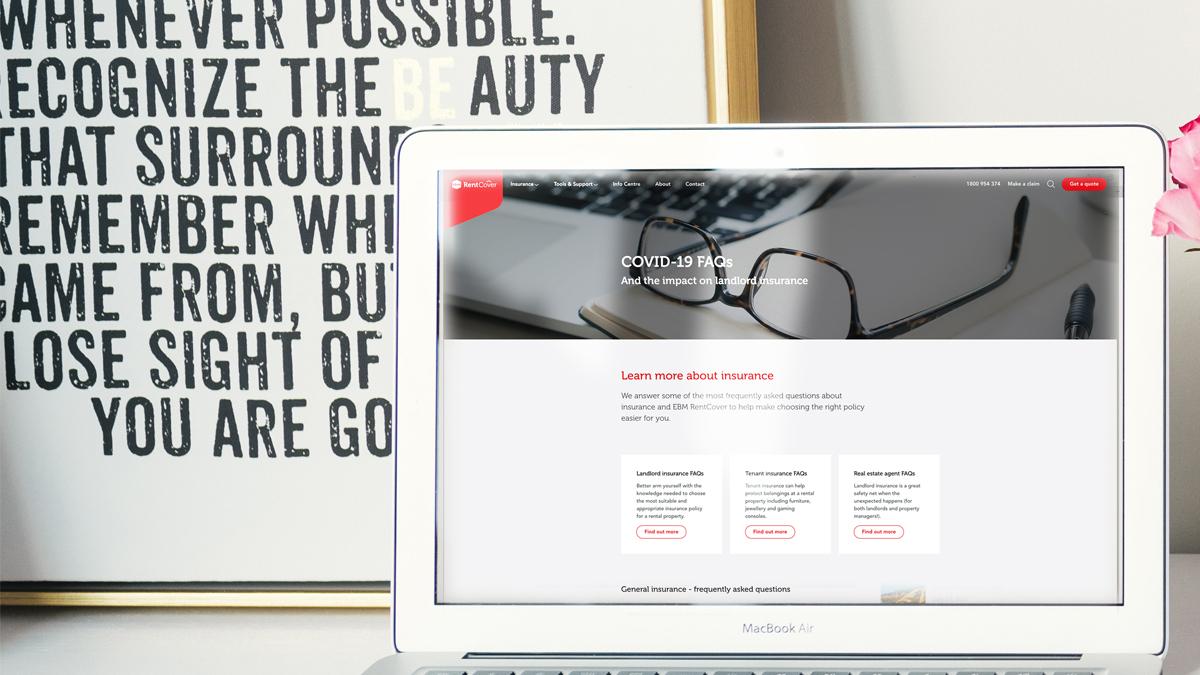It has been over a year since the COVID-19 global pandemic was declared and the impacts of what was dubbed a ‘once in a generation event’ began to be felt.
Many landlords and property managers felt the squeeze as their tenants struggled to pay the rent. The Australian Government moved to protect tenants from being evicted due to COVID-induced hardship and the states and territories implemented their own moratoriums, timeframes and relief packages. Many financial institutions also offered relief for landlords by allowing mortgage payments to be reduced or deferred.
But these measures, and what was happening in the market, also impacted landlord insurance. That’s why we’ve been updating our COVID-19 information pages as things have changed.
By the end of March 2021, moratoriums in most states and territories had ended or transition periods had been announced with some conditions continuing for several months (find out the state of play here). The end of the month also signalled the end of government stimulus (such as JobKeeper) and mortgage ‘holidays’.
Read on for an update on where things stand with landlord insurance now…
I took out landlord insurance before the pandemic was announced. What am I covered for?
The simple answer is, you’re covered for everything that was detailed in your product disclosure statement (PDS) and certificate of insurance. So, if you took out a policy that included cover for tenant-related issues, such as rent default and damage, you’re covered for rent default and damage (subject to the T&Cs of course).
COVID-19 has not altered any of the existing terms and conditions in your landlord insurance policy – it’s business as usual. In fact, all losses are treated with the usual care and consideration offered by the EBM RentCover team. If you need to make a claim for fire damage – we will review it and the policy will respond. Or, if you need to make a claim because your tenant is two months behind in rent – we will review it and the policy will respond. Rest assured, just because we are in a global pandemic, an insurance policy will still cover what it is designed to cover.
Landlord insurance policies are black and white. The documents you receive when you buy a policy clearly outline what is and isn’t covered. So, if your claim meets the conditions of cover, you’ll be paid out.
My policy is due for renewal. Will I be able to keep the same level of cover?
Absolutely! In the same way that what is covered in an existing policy will be honoured, so will your renewal. We aren’t changing what our policies do and don’t cover, so you can rest assured that when you renew (even if the policies aren’t currently available to new clients e.g. Ultra and Platinum), existing policyholders are covered for exactly the same risks that they were when they first took out the policy.
I didn’t take out landlord insurance before the pandemic was declared. What are my cover options?
COVID-19 has thrown the insurance industry into a spin and hard decisions had to be made about how best to protect existing policyholders. The pandemic had financial ramifications for many tenants and the introduction of eviction moratoriums also meant that the likelihood of a landlord having to claim for loss of rent was almost a certainty. And insurance isn’t designed to cover certainties.
While we halted cover for a short while, we now have policies available for landlords who have their properties professionaly managed by real estate professionals. Either chat to your property manager about cover or get a quote and apply for cover here.
The eviction moratorium has ended in my state, how can I claim for rent arrears?
Basically, you need to go through all the normal processes you would have gone through in a pre-COVID environment (e.g. issuing breach and termination notices). Ultimately, everything is now back to usual. So, if there is a tenant who has been in the property and not paying rent, then the eviction process needs to start.
The requirements and rules governing residential tenancies are set out in each state and territory’s legislation and you must follow these. If the laws in your jurisdiction allow you to evict your tenant for rent arrears, then you should follow the correct procedure. To make a claim for tenant-related rental losses, you need to follow the guidelines for legal eviction.
My tenant and I came to an agreement for me to reduce their rent for a while. Can I claim the difference on my insurance?
In a word, no. If you agreed to reduce the rent (say it was $500 per week and you reduced it to $250 per week), then you can’t claim the difference ($250 per week) on your landlord insurance. The tenancy agreement has simply been amended to reflect the new weekly rent ($250), and if that rental amount was paid, you don’t have grounds for a claim.
I reduced the rent but my tenant still didn’t pay. Do I have a claim?
You might. Using the example above, if your tenant still has trouble paying the $250 a week, you could submit a claim for rent default. However, as the weekly rent was reduced to $250, your claim would be based on a loss of $250 per week, not the original $500 per week charged before a reduction was agreed.
My tenant was doing it tough, so I put their rent on hold for a while. Can I claim the rental losses?
Unfortunately, you can’t. As you decided to suspend your tenant’s rent for however long, this is not an insured event (you agreed to let the tenant not pay, they didn’t just stop paying). However, if your tenant does not catch up on payments, normal protocols should kick in and then it may fall under loss of rent provisions and the policy would respond.
I have a short-term rental (protected with RentCover ShortTerm) and the reservations were cancelled so I missed out on the rent. Am I covered?
Like in a normal situation, if a guest decides to cancel a reservation, that loss is not covered. We only offer ‘loss of rent’ cover when a short-term rental property is so badly damaged that it cannot be lived in or rented out to guests. Unfortunately, if a guest just changes their mind and cancels a booking, that cost is not protected.
My tenant returned to their homeland (without terminating the lease as they thought they would come back) and hasn’t returned to the rental. They also haven’t paid their rent and I can’t get in touch with them. What can I do?
You’ll need to follow the processes set out in your state/territory laws and regulations to gain possession of the property. The good news is, this sort of loss would be covered, in line with the T&Cs noted in the policy, as a normal loss of rent situation.
My tenant had to self-isolate. Government restrictions meant I/my property manager wasn’t able to thoroughly inspect the rental. Now that inspections have resumed, there’s significant damage that the tenant refuses to fix. What can I do?
You/your agent need to follow the normal processes for legal eviction. Once you have possession of the property, you can submit a claim for the damage. You will need to prove there was a loss or damage (e.g. with photos, communication with the tenant, receipts for maintenance).
COVID-19 has had a negative impact on demand for rentals in my local area. My tenant is about to move out, will I be covered if I can’t secure another one?
Like a lot of landlord insurance policies, EBM RentCover does not offer protection for changed market conditions when a property is vacant between tenancies. So, if you are unable to secure a tenant, the losses are unlikely to be covered. It is also important to understand that if your property is vacant for an extended period, your insurance is likely to be affected. Please contact one of our Expert Care Team members to discuss your options if your property has been unoccupied for more than 90 consecutive days.
My tenant contracted COVID-19 and self-isolated at the rental. Does my insurance cover cleaning/decontamination?
Bluntly – the answer is no. EBM RentCover policies do not cover general cleaning costs (we only cover cleaning costs as a result of drug labs). It is the tenant’s responsibility to make sure the property is left in the state it was first occupied. If you or your property manager have an issue with the cleanliness of a property, you may be able to use the bond to cover cleaning costs.
What do I need to know about making a claim?
Lile all businesses, EBM RentCover has had to adapt to changing work conditions as the pandemic plays out. While things might be a bit different behind the scenes (e.g. some of our team are working from home), we continue to be there for our clients.
We are sure you can appreciate that many clients have had lots of queries and now that the moratoriums are all but ended, more policyholders will be looking at making claims. This means that it might take our team a bit longer than usual to respond. If the matter is not urgent, you can contact our team via the website or email enquiries@rentcover.com.au. And of course, our online claims portal is available too.
But this does not mean that we won’t give your query or claim all the attention needed. We still aim to offer the same great service you have come to know and love. So, if you need us, we are here. And we are working hard to respond to questions and process claims as quickly as possible.
*While we have taken care to ensure the information above is true and correct at the time of publication, changes in circumstances and legislation after the displayed date may impact the accuracy of this article. If you need us we are here, contact 1800 661 662 if you have any questions.
You may also like
View all
When money is tight, eventually something might have to give. And for tenants, that something may just be the rent payment...

So you’ve made an insurance claim and been told a ‘loss adjuster’ has been assigned. Just who is this person and what do they do?...



